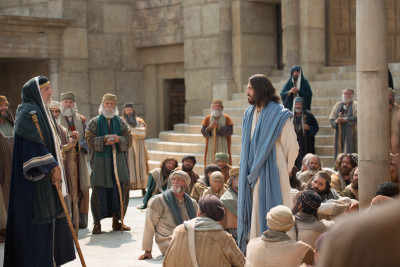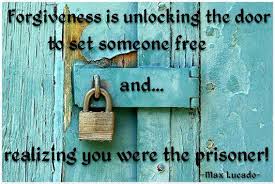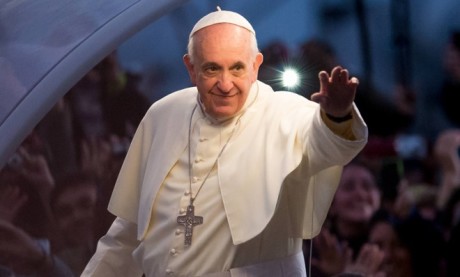
– 29-10-2023 –
Gospel text: Matthew 22:34-40
vs.34 When the Pharisees heard that Jesus had silenced the Sadducees, they got together
vs.35 and, to disconcert him, one of them put a question,
vs.36 “Master, which is the greatest commandment of the Law?”
vs.37 Jesus said,
 “You must love the Lord your God with all your heart, with all your soul, and with all your mind.
“You must love the Lord your God with all your heart, with all your soul, and with all your mind.
vs.38 This is the greatest and the first commandment.
vs.39 The second resembles it: You must love your neighbour as yourself.
vs.40 On these two commandments hang the whole Law, and the Prophets also.”
*******************************************************************
We have four commentators available from whom you may wish to choose . Scroll down to the required author.
Michel DeVerteuil: Lectio Divina with the Sunday Gospels – Year A
Thomas O’Loughlin: Liturgical Resources for the year of Matthew
John Littleton : Journeying through the Year of Matthew
Donal Neary S.J. Editor of the Messenger
****************************************
Michel DeVerteuil
Lectio Divina with the Sunday Gospels- Year A
www.columba.ie
General Comments
Like last Sunday’s, today’s passage is built around a saying of Jesus. I would say about it what I said about last Sunday’s: it is a wisdom saying which the passage invites us to enter into with our feelings. Its truth should touch us so deeply that we are filled with gratitude, and also with humility as we realise that we do not live up to it – as individuals, as a Church and as communities. The saying then becomes a call to repentance.
 The two sayings are similar in that they are both teachings on wholeness:
The two sayings are similar in that they are both teachings on wholeness:
* last Sunday’s spoke of the wholeness which comes from recognising the sacredness of certain values – “giving to God what belongs to him”;
* this Sunday it is the wholeness which comes from recognising right priorities among our various obligations – “which is the greatest of the commandments”.
Wholeness is presented in the form of a journey – we become whole by moving from fragmentation to wholeness. This is a crucial message for our times since fragmentation is one of the characteristics of our modern Western culture and the journey to wholeness one of its greatest challenges. Wholeness therefore defines our Christian mission today. Our special contribution to the modern world is to help ourselves and one another make the journey to wholeness – and this gospel passage shows us how this is achieved.
The passage is addressed to us as individuals in our various vocations – parents, community leaders, ministers of Church communities, spiritual guides and counselors; it is also addressed to us as the Church of our time.
As always we read Jesus’ saying, not merely as theory, but as testimony also. This was how he looked on life at this crucial stage of his journey, when he was in Jerusalem, facing the wrath of “the chief priests and elders” (mentioned explicitly on two previous Sundays), arrest and crucifixion. A good approach to interpreting the passage is to start with Jesus – what was in his mind when he said this? So too a sign that we have made a good meditation is that we celebrate Jesus (and all the people like him) who have touched our lives.
The Pharisees and the Sadducees represent the fragmentation which Jesus rejected – and calls us to reject – in favour of wholeness. As we saw last week, a sign that we have made a good meditation is that we feel compassion for them – we know where they are coming from.
The passage traces the journey to wholeness as a movement from a solid foundation (“the greatest commandment”) which leads to three consequences. The foundation is to put God in the first place, laying claim to our whole selves (“heart, soul and mind”). Once the foundation is set, three things fall into place:
*the neighbour
* ourselves
– the “law and the prophets”.
Let us look at each stage of the movement.
– The foundation – God
We often find ourselves stressed by our many obligations. One day we realise our root problem: we have allowed obligations to become important in themselves, whereas they are important only because they are linked to a basic obligation – our commitment to God, the centre of all our lives. We celebrate that moment of insight.
In our meditation we must make sure to interpret “love” concretely. In our culture it has become vague – meaning many things and therefore nothing very precise. We need then to give it some “body” – meaning such things as “surrender ourselves to”, “put our trust in”, “choose to please”.
“All your heart, all your soul, all your mind”: we do not have to give each of these a separate meaning. A cumulative effect is intended – “your whole self”. The real stress is on “all” which means in the concrete “more than to any person, thing or cause”.
In fact, a good approach to the saying is to start by asking ourselves the question: “who (or what) do I love (surrender myself to, put my trust in, choose to please) more than any other?” That is God for me. The further question now is, “is this the true God, the Father of Jesus?”
* First Consequence – the Neighbour
We then work our way “downwards”. Once God is first for us we will find that love of our neighbour becomes our “greatest commandment”. The two obligations “resemble each other”, meaning that we now  choose to give our whole selves to our neighbour,
choose to give our whole selves to our neighbour,
*spouse
*children
*community
*the human family.
We celebrate the Jesus (person, community, event, bible text, natural phenomenon) who led us to this wholeness.
* Second Consequence – neighbour and self become one
An important area of fragmentation in our modern Western culture is individualism. This concept, which is at the heart of most modern institutions, says that our first obligation as human beings is to look after ourselves. Individualism affects the whole gamut of human relationships – between individuals, nations, ethnic groups, religions etc. It has even affected the life of our church.
Jesus, however, (like all Jesus-like people) totally rejects individualism and upholds solidarity instead. His position is that we and our neighbour are one person – our destinies are inextricably intertwined. As the passage says, when we love our neighbour we are loving ourselves. This integration is another secret of wholeness and we celebrate the Jesus who teaches it by word and example.
*Third Consequence – “the whole law and the prophets” fall into place
In Jesus’ time “the law and the prophets” referred to the Jewish ancestral tradition. We interpret it today of our own cultural traditions. The saying celebrates a time when we experience them as perfectly fulfilled (“hanging together”) in Jesus. This saying then rejects another source of fragmentation in our modern world (one which our Church has contributed to) – the concept that Western culture is superior to others. A sign that the people of Africa, Asia and Latin and Native America have come to “love” the Father of Jesus is that they reverence their “whole law” and their “prophets”.
Like last Sunday’s saying, this one is presented in the context of a story and identifying with the different characters can help bring the story to life for us – always on condition that we don’t look down on them but identify with them.
As we have seen, the Pharisees and Sadducees represent us at the beginning of our journey to wholeness. We can however focus on the fact that they “got together” for the purpose of “disconcerting” Jesus; this is significant because the Pharisees and Sadducees were usually at odds. They therefore represent us when we are afraid to make the journey to wholeness and ally ourselves with anyone who will collaborate with us in running away from it.
We can also consider each separately as representing us when, like the invitees to the wedding feast, we reject the call to wholeness;
– the Pharisees’ learning had made them arrogant and complacent;
– the Sadducees were conscious of their standing in society and wanted to preserve it at all costs. Confronted with them, Jesus remains clear and focused because his priorities are right.
Prayer Reflection
 Lord, forgive us Christians that we have complicated your very simple message.
Lord, forgive us Christians that we have complicated your very simple message.
Like the Pharisees, we have become very learned:
* we know canon law and all the laws of the Church;
* we have listened to all the wise people, both ancient and modern;
* we have studied the background to the books of the bible.
Like the Sadducees, we have influence in society and know how to exercise power.
But the upshot of it all is that we are never sure what we are to do
because one commandment is always in conflict with another,
and there is always some expert who disagrees with what we decide to do.
Thank you, Lord, for sending us Jesus.
In one instant he cleared away all the undergrowth we had allowed to cover up the truth
and we remembered that there is really only one commandment:
* that pleasing you is the only important thing in life;
* that if we seek your will only, we end up loving others and doing what is best for ourselves.
Then suddenly all the many laws and prophets fall into place.
Lord, we thank you for the great teachers who have touched our lives,
they were not learned like the Pharisees,
nor high class like the Sadducees,
but they taught us the basic lessons of life,
and ever since we have been able to put laws and prophets into proper perspective.
Lord, according to the philosophy of individualism
the greatest commandment is to look after ourselves,
to seek prosperity for our immediate families and for our countries.
To defend that commandment,
we quote scientists and doctors and lawyers,
allying ourselves with all sorts of people
with whom we do not normally associate.
 Help us to be simple and uncompromising, like Jesus,
Help us to be simple and uncompromising, like Jesus,
showing that loving others is the same as worshipping you
as well as the only sure way of loving ourselves, and that all laws and prophets must fall into line with this teaching.
*****************************************************
Thomas O’Loughlin
Liturgical Resources for the Year of Matthew
www.columba.ie
Introduction to the Celebration
Why have we gathered here? One answer is to assemble together to show our love for God and for one another – because the whole of the Christian way can be summed up in these two commandments. But let us pause and recall that we do not always love God with our whole hearts nor our neighbours as ourselves.
 Homily Notes
Homily Notes
1. How do we learn to be Christians? The answer is that we have to learn to behave in a particular way: the way of love. It was to establish the community that would live in this way that Jesus was sent to us by the Father; and it is to be the people who live in this way that we are called to belong to the church today.
2. You shall love the Lord your God with all your heart, and with all your soul, and with all your mind; and you shall love your neighbour as yourself.
3. This is what is commanded to each of us; but it is given as the greatest commandment of ‘The Law‘ – and The Law was the most valuable possession of a community, a people. We are each called to love God and neighbour, but we do this not as loners but as part of a community. Then, with each practising love of God and neighbour, the community will be like a transmitter showing the love of God and the new way of life he calls us to live to all around us.
4. People should be able to spot us as Christians by the way we live long before they have found out what beliefs distinguish us.
****************************************************************
John Littleton
Journeying through the Year of Matthew
www.Columba.ie
Gospel Reflection
It is always difficult when people ask us to put a list of items in order of preference. For example, deciding whether we like chocolate more than mints, or apples more than oranges, could take hours. Often in arguments, our opponents might pose a range of options which is almost impossible to answer, such as: Which is greater, your love for your spouse or your love for your children?
This is what the Pharisees thought they were doing when one of them, a doctor of the law, asked Jesus: ‘Which is the greatest commandment of the Law?’ (Mt 22:36). We learn that, in asking this question, the Pharisee was trying to disconcert Jesus. So the Pharisees were hoping that, somehow, Jesus would make a mistake and say something that was incompatible with and offensive to the Jewish religion. Then they could use that against him.
They were jealous of his popularity with the crowds and they knew that they were dealing with a formidable teacher who could quote and explain the scriptures expertly. Surely now, they were thinking, Jesus would fall into the error of belittling at least some of God’s commandments by exalting one over another? We have probably all been in situations like this in discussions and debates, when we have been hard pressed to offer a satisfactory answer without compromising the faith or moral teaching in some way.
Jesus’ reply was simple and direct. First, he emphasised the first and greatest commandment to love God with our whole heart, soul and mind. Nobody could argue against that. The Pharisees must then have been waiting, hoping that a mistake was imminent.

Pope Francis reaches out
Then Jesus added that the second commandment is like the first: ‘You must love your neighbour as yourself’ (Mt 22:39). Next Jesus achieved a masterstroke. Instead of leaving it at that and, perhaps, allowing the criticism that the other commandments (forbidding theft, murder and adultery) are not so important, he added: ‘On these two commandments hang the whole Law and the Prophets too’ (Mt 22:40).
The cunning Pharisees must have been dejected. Not only did Jesus refute in advance any potential claim that he had diminished the importance of any of the commandments, but he had included all the sayings of the prophets in his reply. The greatest of the commandments, which is to love God and neighbour, is the basis for every other law and every exhortation of the prophets who, over many centuries, had spoken about fidelity to God’s will.
The challenge for us is to reflect carefully on Jesus’ defence ol the truth. He did not shy away from the questions posed by the Pharisees, although he knew that they were being mischievous and trying to trap him. Let us resolve to answer honestly and thoughtfully the questions about our faith that are asked by family, friends and colleagues.
For meditation
You must love the Lord your God with all your heart, with all your soul, and with all your might. You must love your neighbour as yourself. (Mt 22:37, 39)
*******************************************
Donal Neary SJ
Gospel Reflections For Sundays Year A
www.messenger.ie/bookshop/
The Energy of True Religion
‘To love God and love your neighbour – this is one of the most attractive of the sayings of Jesus. It is an encouragement to live fully with what brings the greatest joy in life – true love of God and the neighbour. It is at the heart of good religion, and what attracts many to Jesus.
Bad religion puts law above love. Bad religion fights for the partial truth of religion. We risk being victims of bad religion, just as we can be victims of bad nationalism, bad psychology or any other bad way of living. Jesus’ life was to propose good religion and to live by it. The religion of some of the Pharisees was bad, in that it was incomplete in its scope.
 We admire those who give energy in love and service. We are proud of people we know whose lives make a great and good difference to others. We know that our family and neighbourhood, parish and school, workplace and leisure time have been enriched by the self-sacrificing love of many people, young and old.
We admire those who give energy in love and service. We are proud of people we know whose lives make a great and good difference to others. We know that our family and neighbourhood, parish and school, workplace and leisure time have been enriched by the self-sacrificing love of many people, young and old.
‘He gave it his all‘ – we say that of a good player at the end of a match. We say of parents that they “were always there for the children. May we give all we have in our lives, giving in love, knowing that all we give is itself a gift from God, the giver of all good gifts.
Picture Jesus with a sick person; watch him touching the person.
This would he against the law! What would you say to him?
Lord, let love be the guiding principle of all I say and think.